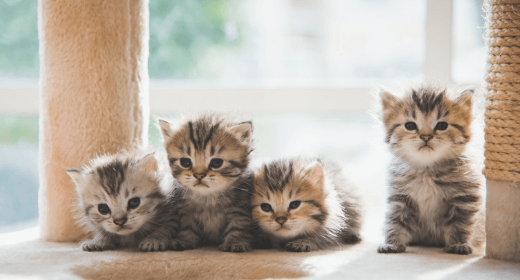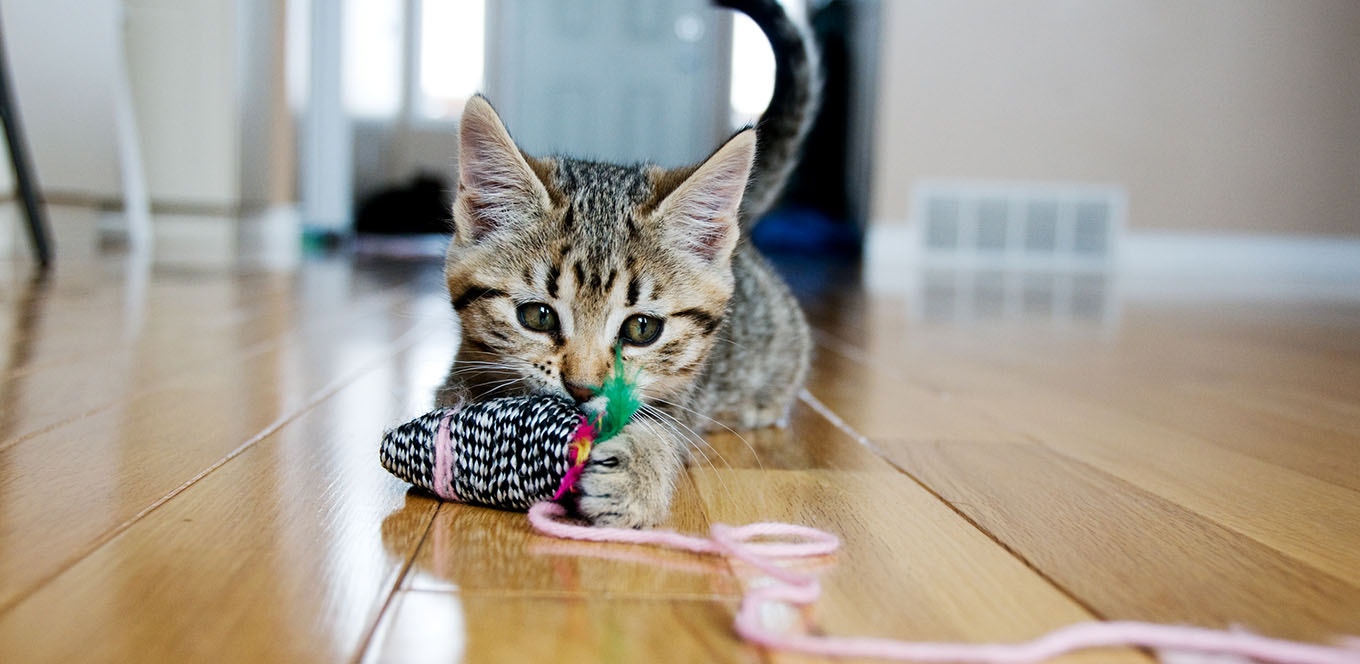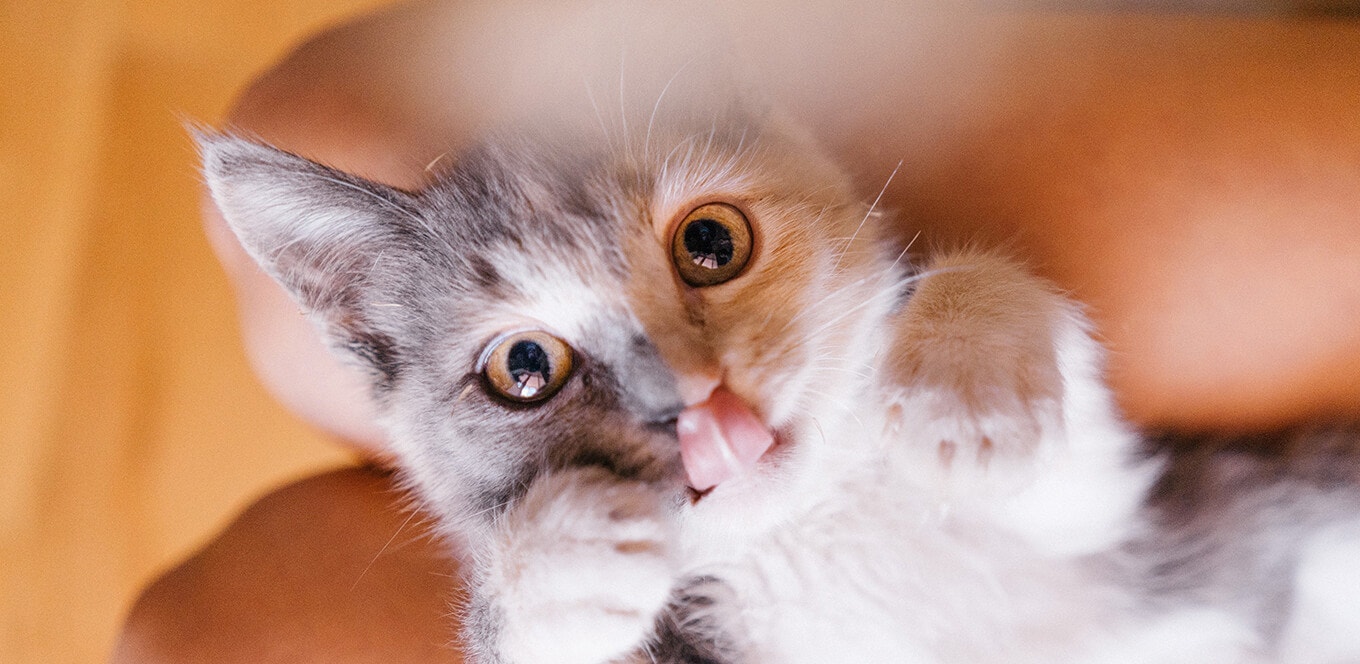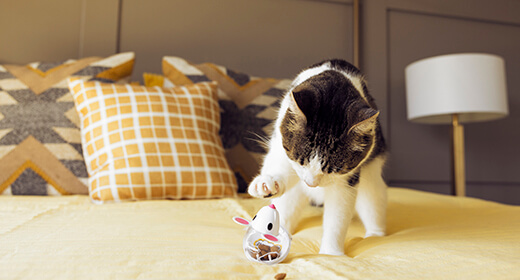

Providing your kitten with the proper nutrition goes way beyond just putting fresh food in a clean bowl. Your kitten’s nutritional needs will change as her body develops through adolescence. Proper nutrition during these critical growth periods will help your kitten mature into a strong, healthy adult cat. Discover four essential kitten-feeding tips you need to know in your kitten’s first year.
Learning what development milestones your kitten will experience in her first year will help you decide what and when to feed her.
After kittens are weaned, they enter a stage of rapid growth, which lasts through the sixth month of life. They need a balanced diet to deliver the nutrients and energy to sustain such rapid development.
Kittens have twice the energy needs of adult cats on a pound-per-pound basis. But their smaller mouths, teeth and stomachs limit the amount of food they can digest during a single meal. Therefore, it may be best to divide their total daily food amount into three or four smaller meals.
Because every bite must be packed with nutrition, kittens require a diet specifically formulated for growth. The best choice is a food with animal-based proteins that is highly digestible, nutrient dense and designed to meet kittens’ unique nutritional needs.
As kittens approach adult size, their nutritional requirements begin to change again. Their rate of growth begins to slow, activity levels may decline and they can start eating fewer, larger meals each day. During this stage, kittens begin to look like adults, but they are still growing and need the special nutrition found in kitten food.
The adolescent growth stage is a time when many cat owners are tempted to change a kitten’s food for variety. But cats do not get bored with a consistent diet of high-quality dry food. You can supplement your kitten’s dry food with a nutrient-dense canned food for a nutritious change of pace.
When your cat is about 12 months old, it’s time to switch to a maintenance formula adult cat food, such as IAMS™ ProActive Health™ Healthy Adult with Chicken. At this age, cats no longer need the extra calories and nutrients for growth supplied by kitten food. As with any change in a cat’s diet, remember to gradually transition from kitten food to adult food over a period of several days.
Monitor your cat’s weight and body condition during the transition, and adjust feeding portions if necessary. Because cats generally eat only what they need, free-choice feeding is fine for most cats. However, some indoor cats that don’t exercise much may overeat if fed free choice. In this situation, portion-controlled feeding twice a day is a good alternative.
Giving a kitten “human food” and table scraps can lead to undesirable behaviors, such as begging or stealing food. Feeding homemade diets or food formulated for adult cats (especially those designed for weight loss), or supplementing a complete and balanced diet with vitamins could cause nutritional disorders.
Kittens and cats are strict carnivores and need the nutrients found in meat. For example, sufficient amounts of taurine, an essential amino acid provided naturally through meat, help cats maintain healthy eyes, heart and reproduction. All IAMS kitten and cat food formulas have optimal levels of taurine for every life stage.




You've just got a new, adorable kitten, and its curiosity and playful nature fill your home with joy. However, one fine day, you notice that your little feline friend is a bit off its game. It seems to be in discomfort and eats barely anything. Moreover, you haven't seen anything in its litter box for a while. Could it be kitten constipation?
Just like in humans, kitten constipation is a condition where your kitten might find it difficult to have a bowel movement. In some cases, this discomfort can be severe and life-threatening, especially if left untreated for more than 48 hours.
While different kittens may present different symptoms, here are some commonly observed kitten constipation symptoms:
Lack of faeces production: If your kitten hasn't produced any faeces for 24-48 hours, it may be a sign of constipation.
Straining to defecate: Your kitten seems to be struggling in the litter box but produces nothing or very small, hard pieces of faeces.
Loss of appetite: Your kitten isn't eating as much as it used to.
Lethargy: The usually playful and curious kitten is spending more time sleeping and seems less interested in activities.
Bloating or vomiting: If your kitten's tummy seems bloated, or it is vomiting, it could be due to constipation.
Kitten constipation can occur due to a variety of factors, such as:
Dehydration: Just like in humans, lack of sufficient water intake can lead to constipation in kittens.
Ingestion of indigestible items: Kittens love to play, but if they end up swallowing items like ribbons or hair ties, it could lead to a blockage in their digestive system.
Lack of defecation stimulation: Unweaned kittens require stimulation to defecate. If this isn't done, they might get constipated.
Intestinal parasites: Heavy parasitic infections in the intestines can also cause constipation.
Neurological or other diseases: Certain neurological conditions or diseases affecting the hindquarters can lead to constipation in kittens.
Now that we've covered what kitten constipation is, let's dive into how we can help our little furry pals.
In a case where your kitten is still active and eating, some home remedies can help alleviate their discomfort. However, if the kitten constipation symptoms persist, or if your kitten becomes less active and stops eating, it's time to seek veterinary assistance.
At the vet, treatments may include fluid injections, enemas, or x-rays to check for blockages. In severe cases, the vet may perform procedures to manually remove the blocked faeces or even surgery.
Your kitten's health and comfort are paramount. If you spot the initial signs of constipation, there are some home remedies you can try before visiting the vet:
Keep your kitten hydrated: Hydration is crucial in preventing constipation. Make sure your kitten always has access to fresh water. If your kitten is fond of dry food, consider adding some water to it to increase their fluid intake.
Add fibre to your kitten's diet: A little bit of fibre can work wonders for constipation. Consider adding a spoonful of canned pumpkin (not pumpkin pie mix) to your kitten's food for a kitten constipation remedy. Moreover, you can incorporate IAMS Proactive Health Mother and Kitten food in your pet’s day-to-day meals to ensure sufficient fibre intake. This kitten food also contains FOS natural prebiotic to improve gut health and digestion.
Get your kitten moving: Just like in humans, physical activity can help stimulate bowel movements in kittens. Engage your kitten in fun, physical activities to keep them active.
Continue observing your kitten: Monitor your kitten closely. If the symptoms worsen or persist for more than a day, it's time to call the vet.
Recovery from kitten constipation is generally swift once the obstruction is removed, but it's crucial to address the underlying cause to prevent recurrence. Follow your vet's instructions to the letter, which may include finishing a prescribed medication course and maintaining regular deworming and fecal checks.
Remember, our adorable little kittens rely on us for their well-being. Being proactive in understanding kitten constipation symptoms and causes can help ensure your kitten stays happy, healthy, and ready to explore the exciting world around them.
Don't hesitate to reach out to a vet if you're unsure. With a little love, care, and the right kitten constipation remedy, your kitten will be back to their playful, cuddly self in no time.